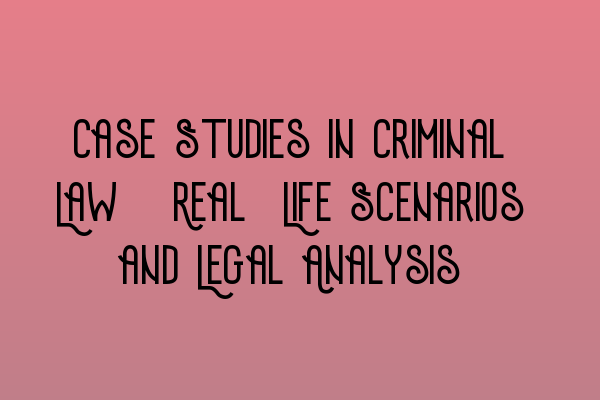Case Studies in Criminal Law: Real-Life Scenarios and Legal Analysis
Welcome to the blog of SQE Criminal Law & Practice Law UK! In this post, we will delve into the fascinating world of criminal law and explore some compelling case studies. Criminal law is a complex field that requires a deep understanding of legal principles, evidence, and courtroom procedures. By examining real-life scenarios and providing a legal analysis, we aim to shed light on the intricacies of criminal law and showcase its relevance in today’s legal landscape.
The Importance of Case Studies
Case studies play a vital role in legal education and practice. They provide an invaluable opportunity to apply theoretical concepts to real-life situations, allowing aspiring criminal lawyers to develop their analytical and problem-solving skills. By studying actual cases, legal professionals can gain insights into the complexities of the law, the challenges faced by both prosecution and defense, and the reasoning behind judicial decisions.
By analyzing case studies, we can also identify trends, patterns, and precedents that shape the development of criminal law. This knowledge allows us to stay informed and prepared, ensuring we offer the best possible legal representation to our clients.
Case Study 1: Murder Trial
In our first case study, we examine a high-profile murder trial that captured the nation’s attention. John Smith, the prime suspect, was accused of killing his business partner, Peter Johnson. The prosecution relied on forensic evidence, eyewitness testimonies, and motive to build their case against Smith.
The defense, led by renowned criminal lawyer Jane Davis, challenged the prosecution’s evidence and argued that Smith was not present at the crime scene. Davis highlighted discrepancies in the forensic analysis and presented an alibi witness who testified that Smith was at a different location when the murder took place.
After a lengthy trial, the jury deliberated and returned a verdict of not guilty. The case highlighted the importance of a robust defense strategy, the scrutiny of forensic evidence, and the burden of proof on the prosecution.
Case Study 2: Financial Fraud
Our second case study revolves around a complex financial fraud investigation. Paul Anderson, a successful businessman, was accused of orchestrating a Ponzi scheme that defrauded numerous investors. The prosecution assembled a substantial body of evidence, including financial records, witness testimonies, and expert opinions.
The defense team, led by experienced criminal lawyer Mark Thompson, challenged the prosecution’s case by arguing that Anderson had no intention to defraud anyone. Thompson presented evidence that showcased Anderson’s legitimate business activities and maintained that any losses incurred by investors were due to market fluctuations rather than intentional deceit.
After a thorough examination of the evidence, the jury found Anderson guilty of a lesser offense, highlighting the technicalities and complexities involved in financial fraud cases.
The Role of Legal Analysis
Legal analysis is a fundamental aspect of studying and practicing criminal law. It involves examining the facts, identifying legal issues, and applying relevant legal principles to arrive at informed conclusions. By conducting a detailed legal analysis of case studies, we can unravel the intricacies of criminal law and gain a deeper understanding of its nuances.
Legal analysis also helps us identify the strengths and weaknesses of a case, assess the viability of legal arguments, and anticipate potential counterarguments. This comprehensive approach allows us to provide effective and strategic legal representation to our clients.
Conclusion
Case studies in criminal law provide an invaluable learning experience for aspiring legal professionals and offer crucial insights for practicing lawyers. By examining real-life scenarios, legal analysis, and courtroom dynamics, we can enhance our understanding of criminal law and refine our skills in navigating the complexities of the legal system.
If you’re interested in expanding your expertise in criminal practice, be sure to check out our related articles:
- Workshops and Seminars on Criminal Practice: Expanding Your Expertise
- Updates in UK Criminal Laws: Staying Informed and Prepared
- Enhancing Your SQE Criminal Law Study Group Experience
- Decoding Criminal Evidence Rules: A Detailed Analysis
- Deep Dive into Fraud and Financial Crimes in the UK
At SQE Criminal Law & Practice Law UK, we are dedicated to providing comprehensive legal insights and resources to help you excel in the field of criminal law. Stay tuned for more informative articles and updates coming soon!
